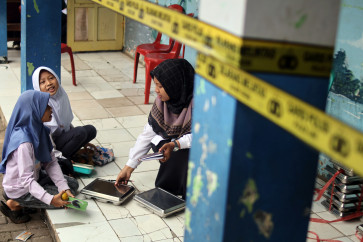Popular Reads
Top Results
Can't find what you're looking for?
View all search resultsPopular Reads
Top Results
Can't find what you're looking for?
View all search resultsUnion activists seek to revive labor politics in Bekasi
Most urbanites in Jakarta are familiar with labor rallies
Change text size
Gift Premium Articles
to Anyone
M
ost urbanites in Jakarta are familiar with labor rallies.
For years, blue-collar workers from Greater Jakarta have made life more difficult for many white-collar workers in the capital city who have to bear the brunt of being stuck in massive traffic jams every time they take to the streets to voice their demands.
Labor unions are alive and well. They regularly hold rallies, repeating the same demands: higher wages, more benefits and an end to various unfair labor practices.
But how effective are these rallies, which may seem, in hindsight, like Sisyphean endeavors?
Obon Tabroni, a labor activist from Bekasi regency, West Java, believes that holding rallies is not enough and is now seeking to bring labor politics back to life.
“If we talk about labor welfare, wages, issues of outsourcing, education and health; all of them depend on political interests and policies. So, it is no longer realistic to be apathetic to politics,” Obon told The Jakarta Post recently.
Obon said he was aware of the state of labor politics today.
The last time a labor party took part in general elections was in 2009. The Labor Party, established by renowned leftist politician Muchtar Pakpahan, only garnered 0.25 percent of the vote. It was its third failure since the 1999, the first democratic election held after the downfall of Soeharto a year before. At the time, the party was named the National Labor Party (PBN). In 2004, it changed its name into the Social Democratic Labor Party (PBSD).
As chairman of the Bekasi chapter of the Indonesian Metal Workers Federation (FSPMI), which is under the Confederation of Indonesian Workers Unions (KSPI), Obon decided to run as an independent candidate in the upcoming local election.
With his running mate Bambang Sumaryono, Obon managed to obtain some 250,000 ID-backed signatures, or almost twice more than the requirement stipulated by the Regional Elections Law to run independently.
It may not be that difficult for Obon to gain support in Bekasi, which is one of the biggest industrial areas in the country.
The regency has a working population of around 1.2 million, where he only needed to secure the vote pledges from 6.5 percent of the constituent.
But his ability to garner the required support indicated that he was popular enough to compete in the election, said Paramadina University political analyst Hendri Satrio.
However, he added, whether or not the Obon-Bambang team could win the election had a big question mark. “The history records show no representative of labor has finished on top.”
In the election, Obon will go against candidates supported by major political parties, including popular singer-songwriter Ahmad Dhani.
Dhani, is running in Bekasi after failing to have the backing in Jakarta’s gubernatorial race as the deputy regent candidate of Sa’aduddin, who is endorsed by the Prosperous Justice Party (PKS), as well as the Gerindra, Democratic and Hanura Parties.
Obon said he was part of a movement in the regency dubbed “buruh go politics”, which calls on workers to become political.
In the last five years, many workers had become more aware of politics, Obon said. In 2014, nine labor union activists took part in the legislative election. Today, two representatives from labor unions sat on the Bekasi council. They are affiliated with the Indonesian Democratic Party of Struggle (PDI-P) and National Mandate Party (PAN).
Nowadays, around almost 70 percent of the members of representative bodies come from the elite, whose policies are not in line with what labor needs, Obon said.
“[Labors’] political awareness is getting stronger. Labor is now directly involved in politics and it is hoped that it will play a policy-making role, which is better than holding demonstrations,” he said.










